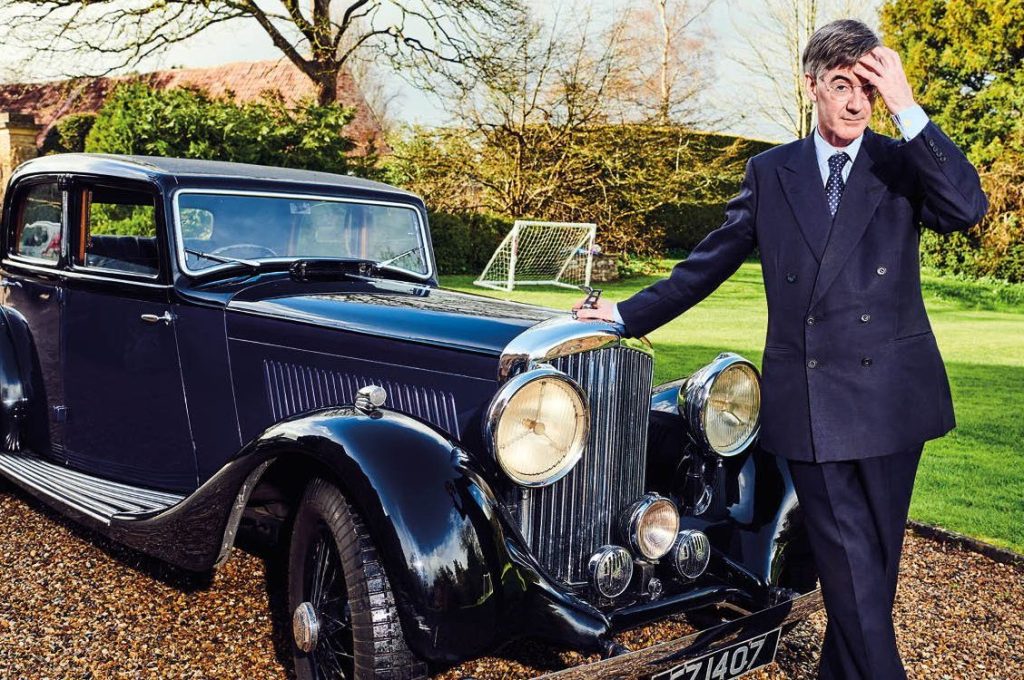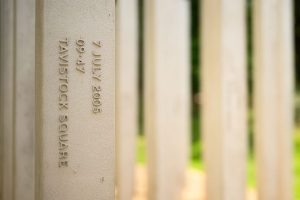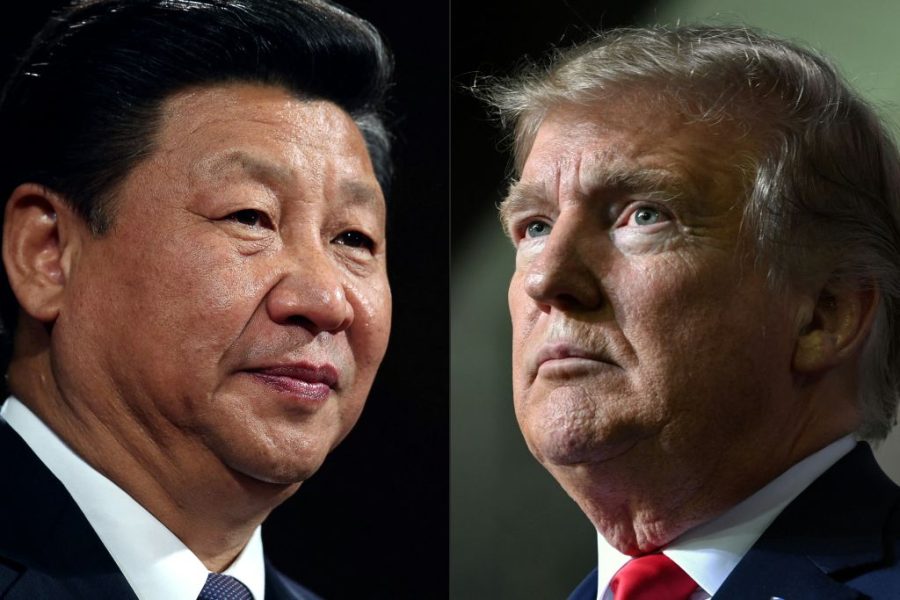Before I arrived at Gournay Court, Jacob Rees-Mogg’s seventeenth-century home in Somerset, I’d missed the main event. Beforehand, I’d asked the Conservative Member of Parliament to lean in to whatever our photographer asked — and somehow, before I turned up an hour late, she managed to get him in a nearby field feeding sheep from the palm of his hand. He didn’t seem to mind. In fact, there were only a few times he said no to our increasingly deranged demands. Once was after we asked him to get up on the humongous dining room table, spread his legs and act natural. “Well, I couldn’t possibly do that,” he replied.
When you drive up to Gournay Court, you encounter what I can only describe as the quintessential British upper class. Think afternoon tea at the Savoy. There’s a ginormous home, nine bedrooms if I remember correctly, a staff member who brought me coffee upon request and an extremely fluffy dog, Daisy. There are outbuildings, portraits, Bentleys, bone china and multiple children running around in fetching school uniforms.
There is also the man himself, wearing the only suit I’ve ever spotted him in. Double-breasted, of course. “Can I spark up a cigarette?” I asked, fretting I’d be reprimanded on the most manicured lawn my unmanicured toes had ever touched. “Of course!” Jacob replied. He has a very naughty laugh, like a schoolboy. I asked if he wanted to bum one of my cigarettes. “I’ve never even tried one,” he replied, still cackling.
Jacob Rees-Mogg has, in recent years, become a caricature of a British conservative. He oozes privilege. He is, in most ways, completely unrelatable. When I asked if he owned anything other than a suit, if he preferred to don a t-shirt on a Saturday morning to walk around his lawn, he replied, “Why on earth would I do that?” His father, William Rees-Mogg, the former editor of the Times, was made a life peer in the House of Lords in 1988. His sister is called Annunziata. He is well-educated and therefore well spoken. (Mogg attended the best schools in Britain: Westminster Under School, Eton and Trinity College, Oxford.) But as intimidating as his persona may be, the Boris-backing, Brexit-defending, big-C conservative Jacob Rees-Mogg, is, to my surprise, staggeringly ordinary.
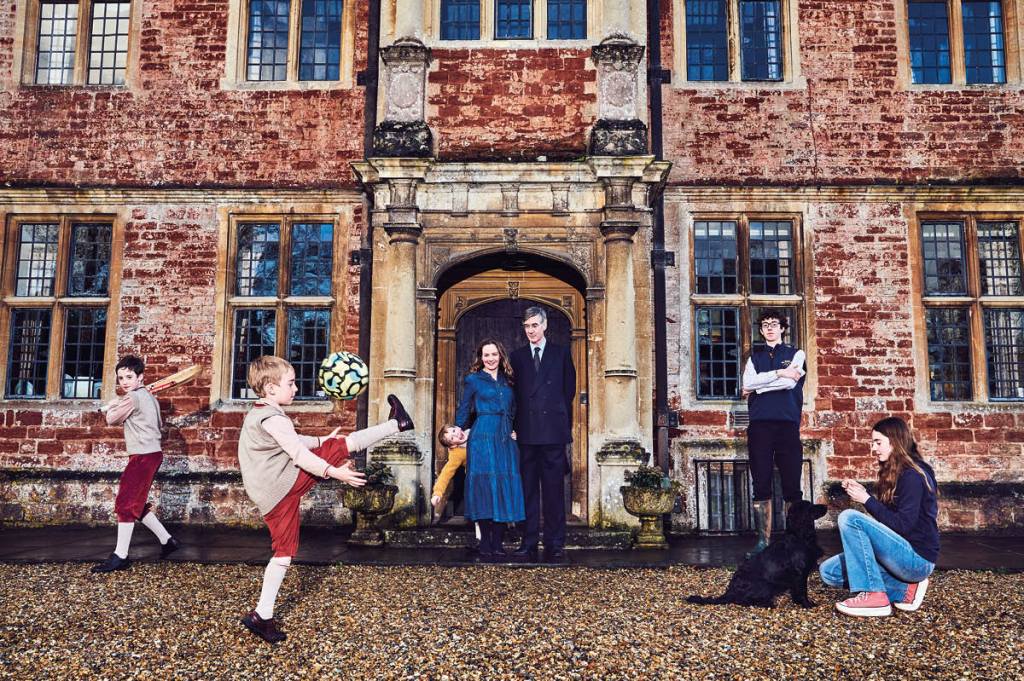
The start of our unofficial interview, I will admit, was self-interested. As we walked around the lawns of his red sandstone country house, I lamented about how ridiculous London house prices have become. “Isn’t the very point of conservatism to own a home and raise a family?” I asked, going after the Tories who have allowed house prices to rise by 50 percent over the last twelve years. As any politician would do, he nodded along sympathetically. But unlike every other one who’s been subjected to my rant on the subject, Jacob turned to me and said, “I completely agree with you. It cannot go on like this. We are letting down the next generation.”
As well as refusing to spread his legs across a table, he also politely declined my request of putting on a top hat and tails and eating jam on toast. Jacob is no-nonsense. He tells me that for this shoot, “I won’t do anything I wouldn’t normally do.” This rationale is hard to believe coming from someone who so publicly backed Boris Johnson throughout his painful, elongated, dragged-out-kicking-and-screaming end. Out of pure nosiness, when I spotted one of Boris’s many books on a chair in the beautiful dining hall, I asked if the blond-mopped bumbler had been over recently. “He was here a few weeks ago for a dinner party,” said Jacob. At once, I demanded to be invited to the next one because I’ve always wanted to get Boris for a fashion shoot. “He’d love that,” replied my host.
As the Conservative Party has slipped into centrism under Boris’s successor Rishi Sunak, Rees-Mogg increasingly finds himself alienated from both sides. He’d never admit this himself, especially since he wants to keep his Somerset seat at the next election. The left despises him so much that I’ve found myself arguing with friends from my very left-wing Welsh hometown over the simple fact that I’d met the guy. I didn’t dare admit that I also liked him. Righties are apprehensive too; he died on Mount Boris along with other figures who quickly faded into irrelevance. He isn’t “woke” enough for the aspirational right that’s realized that the only way to survive nowadays is to pretend they are a-bit-left. He carries around a Bible, or at least he did the previous time I’d met him, when he was asked what a woman was, in that weird period of time a year or two ago where it was the big “gotcha” question. (He whipped it open to Genesis and quoted, “This at last is bone of my bones and flesh of my flesh; she shall be called Woman, because she was taken out of Man.”)
Jacob’s most unemployable trait right now, his biggest crime, is that he is a true conservative in a time when true British conservatism hardly exists. He’s for “the individual against the state.” He is against a “society wrapped in cotton wool.” He calls people snowflakes. He is a traditionalist. When I asked why, he said, “Preserving old things is a link to our history and our forebears. Who has held this before or been through these doors?” In a bizarre move, probably motivated by political (and therefore career) uncertainty, in January, he took up the offer to host his own chat show on the fledgling right-wing news channel GB News. He now performs what is called a “Moggologue” and babbles with guests and says one-liners such as “Make sure you come back after the break, don’t Mogg me off!”
I should be less forgiving. After all, Jacob single-handedly ruined my vision for this entire spread when he halfheartedly agreed to, then later refused, a fashion shoot. He was pretty game for some of it, but I wanted him shirtless on the grass reading a copy of Playboy with a cigar hanging out of his mouth. I wanted to sex it up. On the day, he protested. In a last attempt to get what I wanted I tried to make him change outfits. “What other styles do you wear?” I asked. “I don’t think I have a style; I just wear the sort of things my father wore,” he replied. The most I managed was to get him to pull his sleeves up when we went out to the building where he presses his own apples to make hard cider. “If you would like some, Kara, we’re always looking for people to help us drink the stock.” Suddenly his betrayal no longer bothered me much.
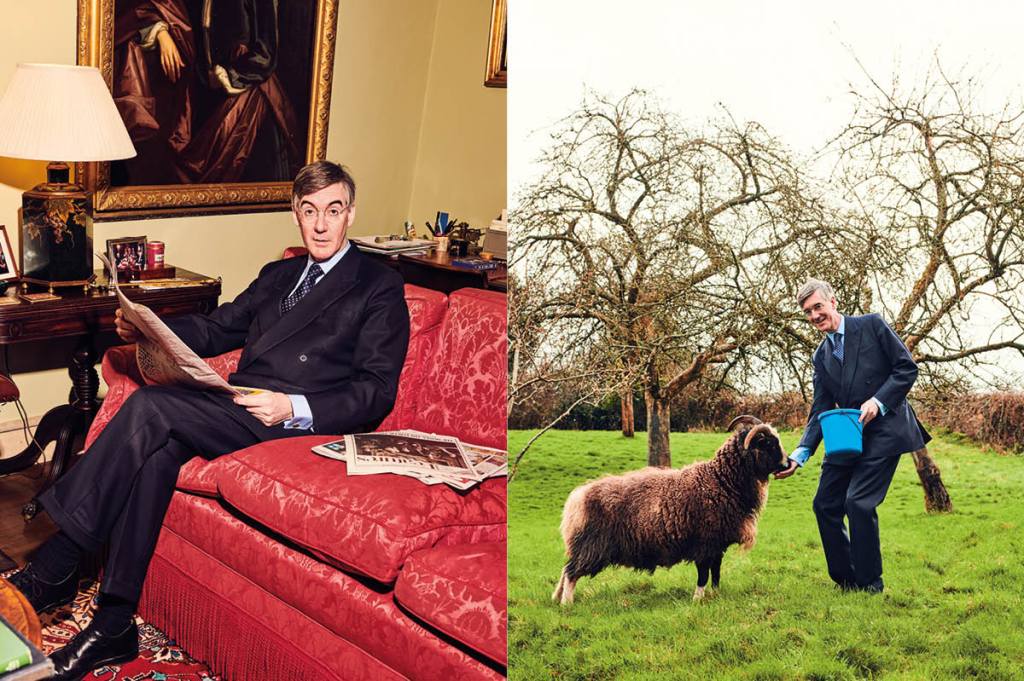
Somerset is cider country. I’ve always thought that there are only two types of people who drink cider: rugby players and homeless people. (Or should I say the un-housed?) Anyway, Rees-Mogg put a fork in my hypothesis, because he doesn’t fit in either box. “The cider really came about because we have a small orchard, four or five apple trees, not an enormous number, but the number of apples produced is huge.” As he walks us up the path, he says that to collect them all, put them through, and press a round, he’s enlisted some of his six children. “It has to be a family affair to make about sixty gallons of cider,” he said. He and his housekeeper — whose name I can’t remember for the life of me and it’s too late and too weird to call up and ask him now — have come up with what Jacob describes as a really brilliant name that they’re thinking of putting on labels for the cider. I ask him for the name, looking for the exclusive. But for the life of him he can’t remember, and probably thought it would be too late and too weird to call me up after our meeting to tell me.
All six children are home from school by now, and though it’s far too late in the day, we switch from talking about cider and suits and his dog’s favorite food to what I came here to talk to him about: America. He’s more Irish than Joe Biden, he tells me, but jokes aside, his American links are something that he and his family are very proud of. “My father was particularly proud of our connections across the pond. His mother was American and grew up in Mamaroneck in New York. There’s a school called the Daniel Warren School in Mamaroneck and her father was Daniel Warren. He ran something called the American Trading Company.”
While he’s explaining these various links to me, including that his American grandmother’s four grandparents had left Ireland after the potato famine, he’s waving his arms around and pointing to portraits of these characters throughout the room. While he’s explaining the different branches of the family tree, his youngest child runs in with what is either a sword or a very sharp walking stick and jumps on Jacob’s lap. Jacob embraces him, forgets where he was in his lineage and starts giggling.
He tells me about his favorite spots in the States. When he worked in business, he would often be shipped off to New York and Washington. But the place that he recalls most fondly is Jacksonville, Florida. I’ve just spent a month in the Sunshine State, and I find it hard to picture Jacob Rees-Mogg mingling with the locals in shorts and flip-flops. “They were the nicest people you could deal with, charming and so wonderfully understated,” he says. I ask if he’d popped into Disney World and he replies that it was never on his list. “Not even for the kids?” I asked, as the youngest was still waving around the unidentified object. “No, it’s not on the list of top holiday destinations,” he said. “Where is on the list?” I asked. “In an ideal world I’d stay in Somerset.”
At some point in the day I learn that Jacob naps in his suit. Confused, I ask for his daily routine to get more insight into how the other half live. “Well, I wake up and I do some Swedish drill. After that I go swimming, listen to some cool music and have some breakfast.” “Cool” is not a word I’d expected from Jacob. I fixate on that — it takes me far too long to realize that he’s joking till Jacob — and everybody else in the room — burst out laughing. When he describes his actual routine, I learn that it is far more mundane. I do find out that he hates early mornings. “I regularly refuse to do early morning TV and radio interviews on the basis that it is much too early and uncivilized.”
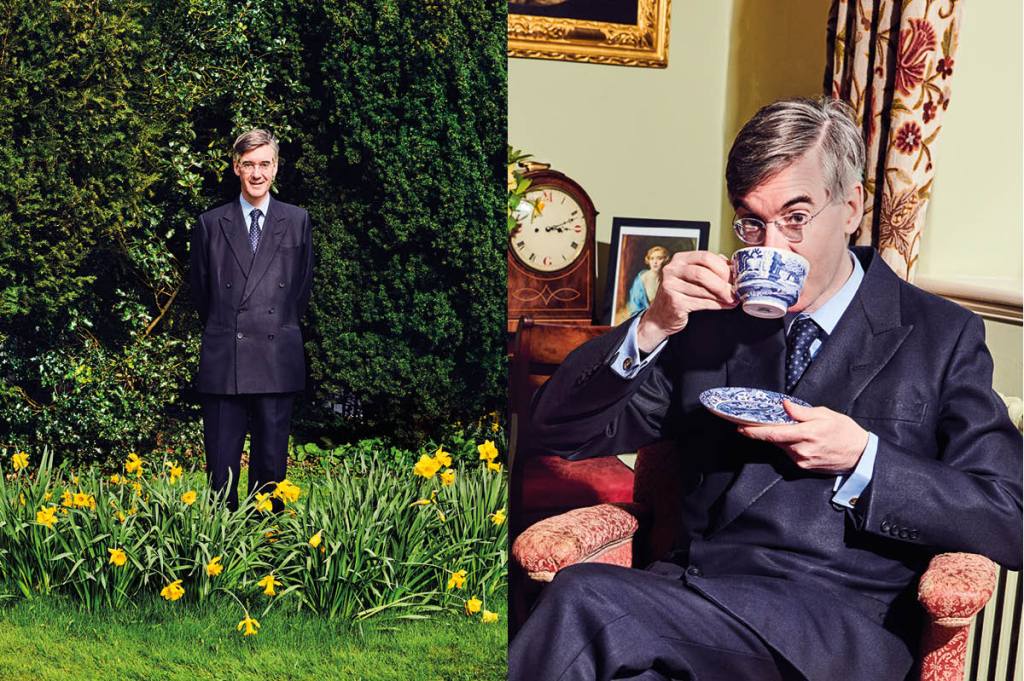
Before I’d arrived at the house, I’d braced myself for what I thought would be an overwhelmingly stuffy experience. It turns out that British politicians, or at least this very posh one, are for the most part, normal. The dog barked, the kids played and Jacob and his wife Helena discussed normal things, like what they were having for dinner that night. Weeknights they all pile on the sofa in front of the TV.
At the time I was there they were engrossed in an Only Fools and Horses spinoff called The Green Green Grass, which Jacob described as “very, very fun.” Foyle’s War and Inspector Morse are other favorites. When it comes to films it’s James Bond, particularly the older ones, definitely The Spy Who Loved Me. He also loves The Godfather. I’ve never seen it so when Jacob asks me, “Do you ever wake up with a horse’s head in your bed?” I assume it’s something to do with the film and he’s not being weird.
It’s not clear where Rees-Mogg will find himself next. The Tories are set to get annihilated in the next general election and I can’t see him as a veteran presenter for GB News, no matter how good his one-liners are. The good thing for Jacob is that he has options. If he ever remembers the wonderful name for his cider he can begin selling wholesale and start a family business. He could take up cricket on his enormous lawn. Whatever happens, he always has Somerset.
This article was originally published in The Spectator’s July 2023 World edition.



